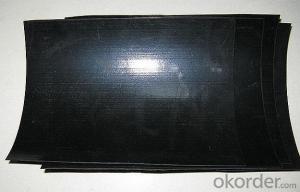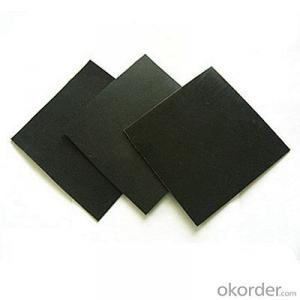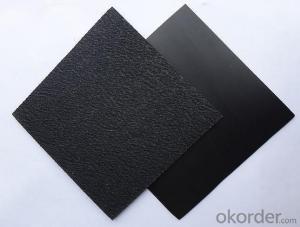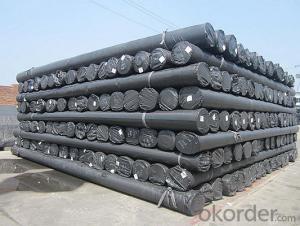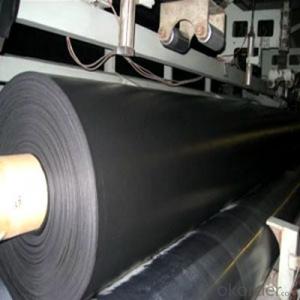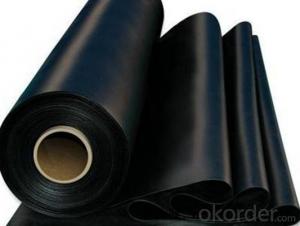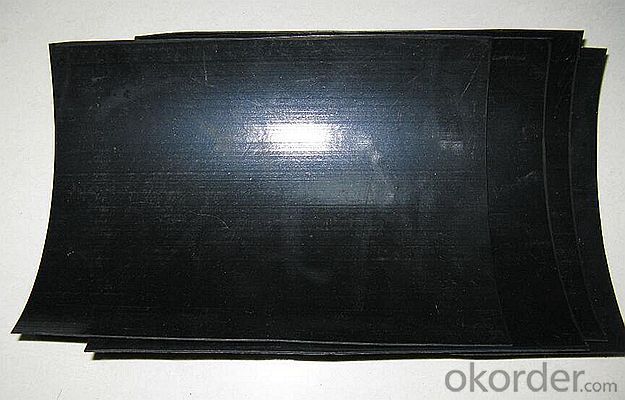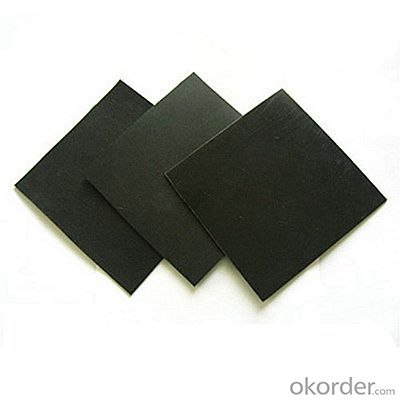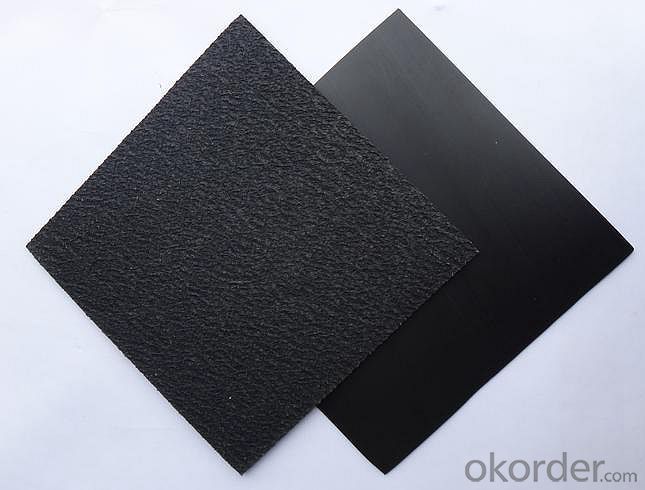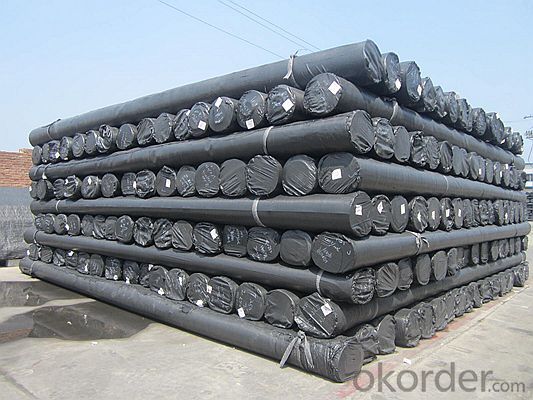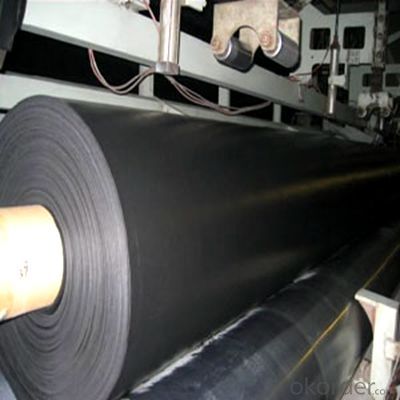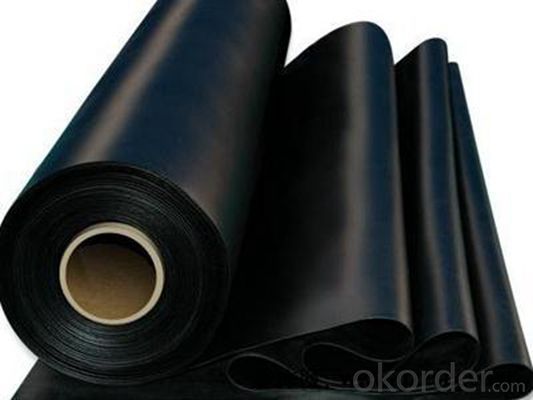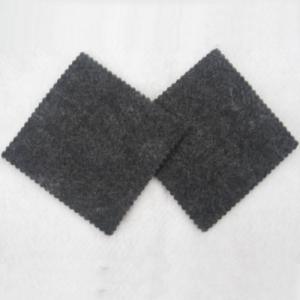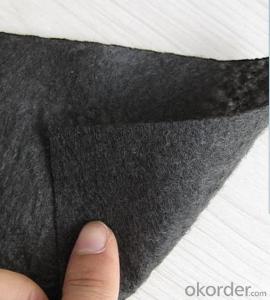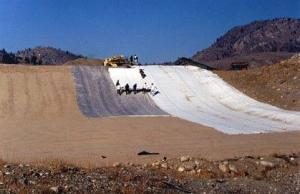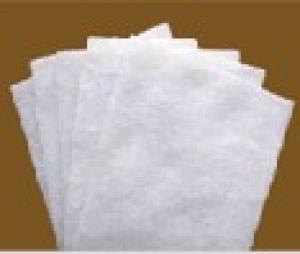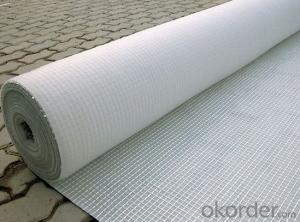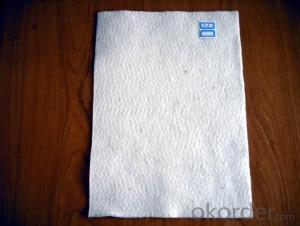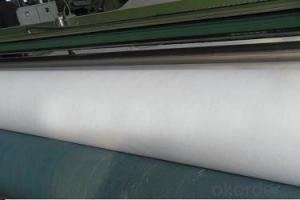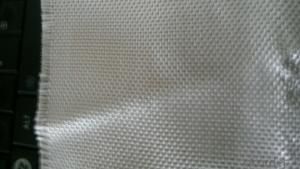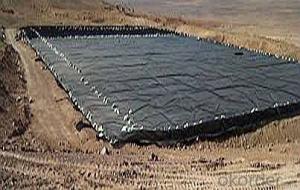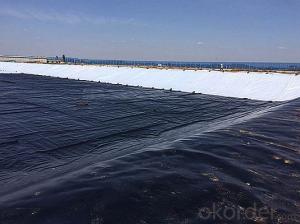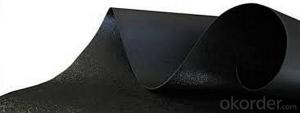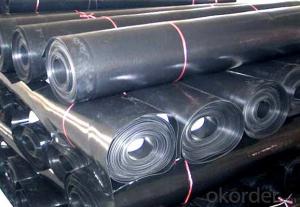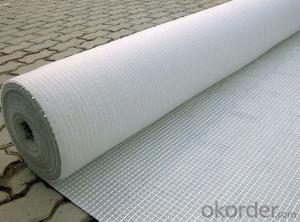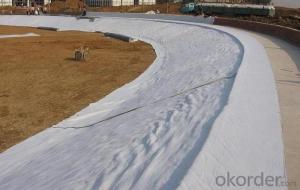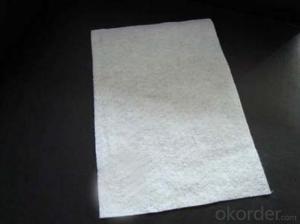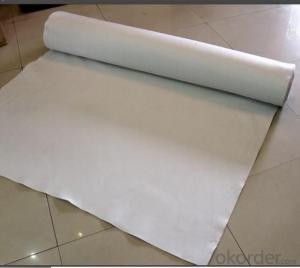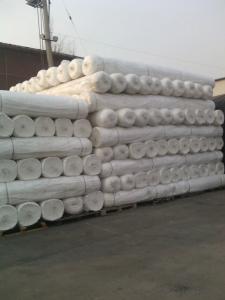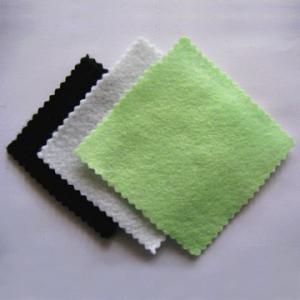Para Que Sirve El Geotextil - Best Quality Linear Low-Density Polyethylene Geomembrane
- Loading Port:
- China main port
- Payment Terms:
- TT OR LC
- Min Order Qty:
- 1000 m²
- Supply Capability:
- 1000000 m²/month
OKorder Service Pledge
OKorder Financial Service
You Might Also Like
Specification
Applications:
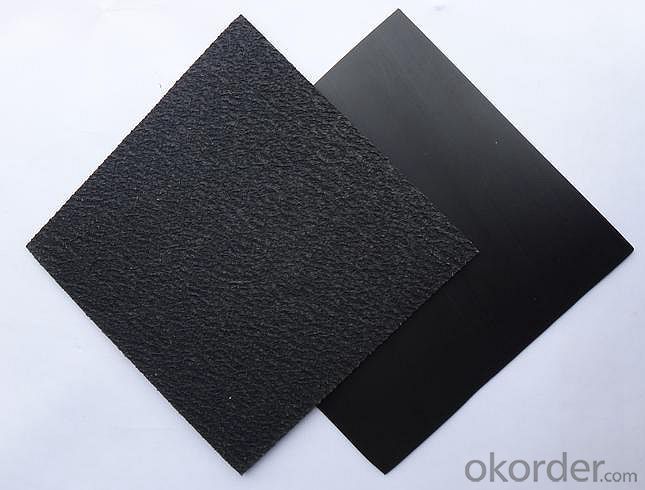
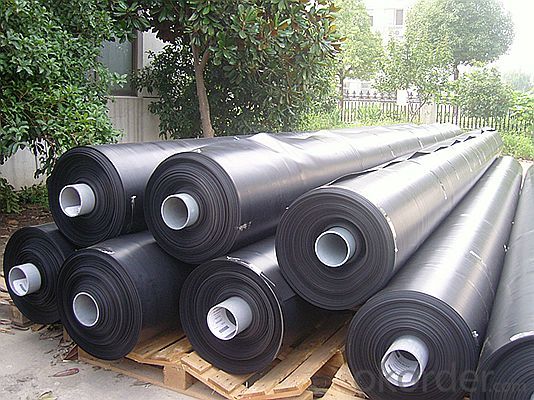
Flexible membranes are used in a variety of applications, such as:
Landfill lining
to protect the ground water from contamination.
Landfills capping
to prevent fluid flow in the landfill, to trap and properly vent the gases generated during decomposition of organic waste and to permit efficient revegetation and restoration of the area.
Water reservoirs
for collecting rain-water before it reaches the sea.
Reservoirs for waste-water
to protect the groundwater sources or streams.
Pond-lining
for artificial lakes and irrigation of farms.
Irrigation canals
an economic alternative to concrete and compacted earth for transporting water and irrigating large areas. Also used to reduce seepage from existing deteriorated concrete linings.
Protection of lake banks
for soil stabilization.
Tunnels
protecting the structure against humidity and water pressure.
Earth dams
for soil stabilization.
Underground insulation
of chemical plants, petrol stations & roads to prevent chemicals, oil etc. from polluting the underground water in case of a leakage.
Mining
for preventing contamination of the soil and underground water and permitting extraction of precious metals by heap leaching, using chemical solutions.
Tanks
secondary lining for preventing pollution in case of leakage or chemical spill.
Insulation of buildings & construction projects
Evaporation basins
Aquaculture
Water reservoirs for fish breeding.
Our Service
Quality assurance
1.On a regular basis or as per your request,we entrust national testing agencies to conduct quality inspections
2. Strictly in accordance with the ISO9001-2008 international quality system standard,we monitor and manage the whole process throughout production,quality testing,and measurement to ensure product quality
3. For quality-related construction delay or substandard construction(except for damage or losses due to customer’s responsibility or irresistible natural disasters),we have refunding,replacement,and repair services.We will respond to customers’ feedbacks on quality issues within 24 hours.
Packing: PLASTIC FILM INSIDE, AND WOVEN BAG OUTSIDE
Shipping: About 15 days after receipt the deposit
FAQ:
Q: What kind of payments does jenor support?
A: T/T, L/C, Cash are accepted.
Q: Do you charge for the samples?
A: Accordeing to our company policy, the samples are free, we only charge the freight fee. And we will return the freight fee during the next order.
Q: Can you produce according to customers' design?
A: Sure, we are professional manufacturer, OEM and ODM are both welcome.
Q: Do you have other products?
A: Yes, please check the pictures:
Packaging & Shipping
- Q: Will you master knitting reinforced geotextile H and reinforced geotextile What is the difference? In addition, how to distinguish between spunbond and weaving in reinforced geotextiles? More
- Texture and material ratio is different ah.
- Q: Can geotextiles be used in geogrid reinforcement applications?
- Yes, geotextiles can be used in geogrid reinforcement applications. Geotextiles are often used in combination with geogrids to enhance their performance and provide additional benefits such as soil separation, filtration, and erosion control.
- Q: What are the advantages of using geotextiles in road construction?
- There are several advantages of using geotextiles in road construction. Firstly, geotextiles act as a barrier between the subgrade and the base material, preventing the mixing of the two layers. This helps in maintaining the stability and quality of the road. Secondly, geotextiles help in distributing the load more evenly across the road surface, reducing the stress on the underlying layers and increasing the lifespan of the road. Additionally, geotextiles can improve the drainage system by allowing water to flow through them, preventing the accumulation of water and reducing the chances of road damage due to moisture. Lastly, geotextiles are cost-effective and easy to install, saving both time and money in road construction projects. Overall, the use of geotextiles in road construction enhances the durability, strength, and performance of the road, making it a beneficial choice for infrastructure development.
- Q: Can geotextiles be used in the construction of underground storage facilities?
- Yes, geotextiles can be used in the construction of underground storage facilities. Geotextiles are commonly used in civil engineering projects to provide reinforcement, filtration, and separation functions. In the case of underground storage facilities, geotextiles can be used to reinforce the walls, prevent soil erosion, and provide drainage, ensuring the structural integrity and longevity of the facility.
- Q: What are the key factors to consider when selecting a geotextile?
- The key factors to consider when selecting a geotextile include the project requirements, such as the anticipated load and traffic conditions, the desired level of filtration and drainage, the soil type and conditions, and the durability and lifespan of the geotextile. Additionally, factors like cost, availability, and environmental impact should also be taken into account.
- Q: Consult geotextile and geomembrane is not the same thing?
- Geomembrane completely soiled geotextile is to keep the wet state of water will evaporate
- Q: Garage top back to the soil before the drainage board geotextile take what role
- The top surface of the drainage board glue a layer of geotextile filter to prevent the passage of soil particles, so as to avoid drainage channel obstruction of the drainage channel, said white is to do a filter layer, the water discharged to the designated location, the traditional process is Block ah, stone ah, what do the water layer, and now with the drainage board is not the reason for the stone is the drainage board is plastic, light weight, can reduce the load of the building. Manufacturers of drainage board geotextile waterproof board
- Q: Planting roofing geotextile lap way
- Lap 10 cm, sewing with sewing machine, I specializing in the production of roofing with geotextile, drainage board and other products, wish smooth
- Q: How do geotextiles help with subgrade stabilization in road construction?
- Geotextiles help with subgrade stabilization in road construction by acting as a barrier, separating the subgrade soil from the overlying base and pavement layers. This prevents the mixing and contamination of different soil layers, enhancing the overall stability and strength of the road. Additionally, geotextiles improve drainage by allowing water to pass through, reducing the risk of water accumulation and subgrade saturation, which can lead to softening and failure of the road.
- Q: What are the factors to consider when selecting geotextiles?
- When selecting geotextiles, there are several factors that should be considered. These include the intended application or project, the required strength and durability, the desired permeability and filtration properties, the site conditions and environmental factors, as well as the cost and availability of the geotextiles. It is important to choose a geotextile that is suitable for the specific requirements of the project and can effectively perform its intended function.
Send your message to us
Para Que Sirve El Geotextil - Best Quality Linear Low-Density Polyethylene Geomembrane
- Loading Port:
- China main port
- Payment Terms:
- TT OR LC
- Min Order Qty:
- 1000 m²
- Supply Capability:
- 1000000 m²/month
OKorder Service Pledge
OKorder Financial Service
Similar products
Hot products
Hot Searches
Related keywords
